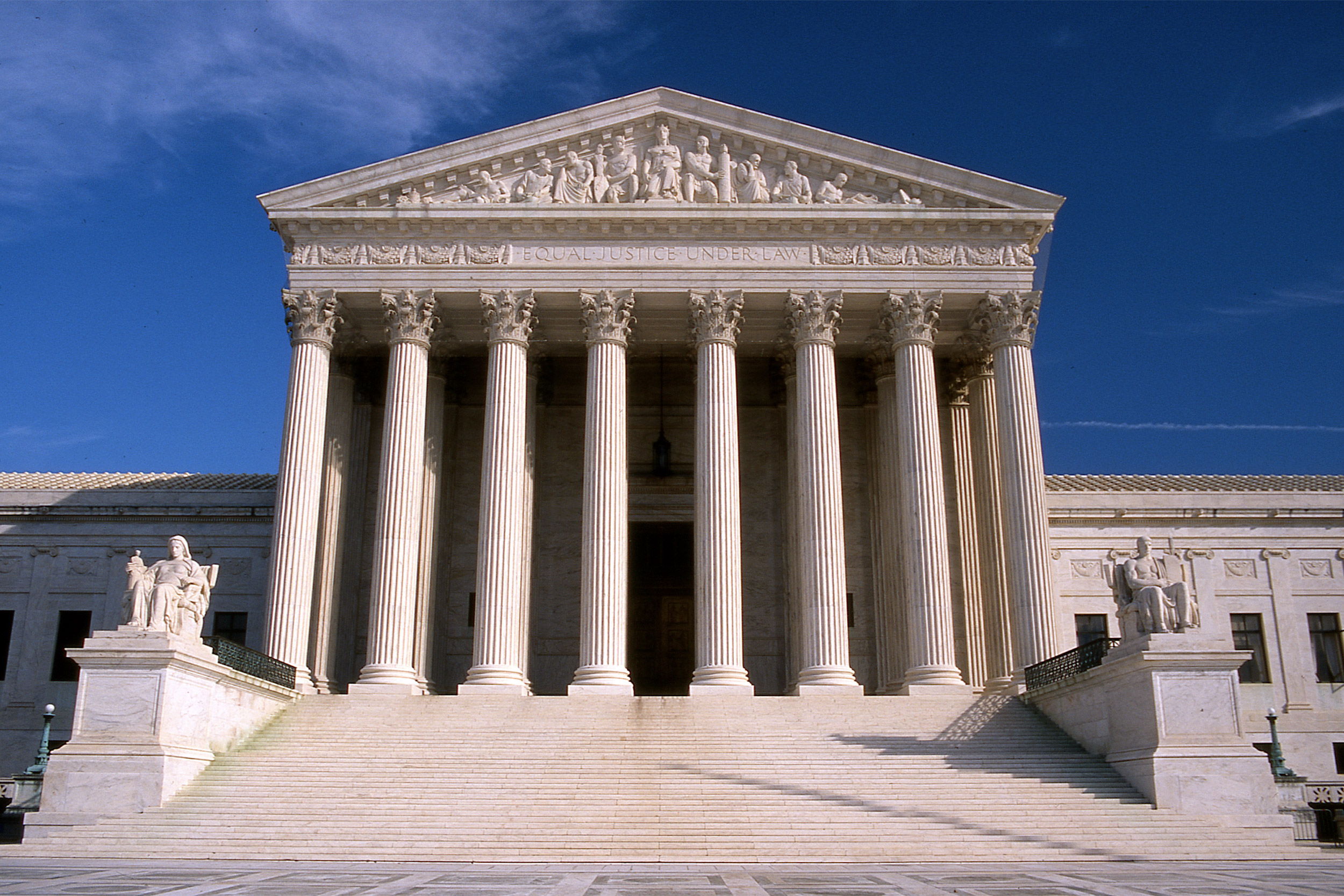
Time for Supreme Court to adopt ethics rules?
Retired federal judge Nancy Gertner says lack of transparency, recent incidents involving justices, spouses, activists have tarnished public standing
The policymaking body of the federal courts recently issued revised rules requiring all judges to offer a fuller accounting of meals, trips, and gifts they receive from corporations and other organizations to increase transparency and avoid questions of conflict of interest. But it also renewed attention on the fact that the Supreme Court has not adopted a series of enforceable rules governing conduct while all other federal judges must follow the Code of Judicial Conduct. Judicial analysts say recent news reports of texts by Justice Clarence Thomas’ wife, Virginia, with Trump Chief of Staff Mark Meadows and conservative activists about blocking or overturning the 2020 election, along with stories about connections between some justices and conservative activists, point up the need for action.
The Gazette interviewed retired federal Judge Nancy Gertner, senior lecturer on Law at Harvard Law School, about why the nation’s highest court doesn’t have a code of conduct and whether it should.
Q&A
Nancy Gertner
GAZETTE: All federal judges must follow a judicial ethics code. What is included in this code?
GERTNER: Various things. On the one hand, there are requirements of disclosure of your financial arrangements and whether there are potential conflicts of interests between your interests and the litigants in front of you. There are recusal rules, which focus on what are the circumstances under which you can fairly decide a case, not just if there’s an actual conflict, but if there is the appearance of a conflict. In other words, there are rules of disclosure, meaning that you must disclose your financial entanglements if you have them. And then there are rules by which you must relate those financial and other affiliations to the case in front of you, which are the recusal notions. And then there are rules with respect to how you conduct yourself in court that aim to avoid doing anything to undermine the legitimacy of the institution. I’m speaking in very general terms, but they’re much more specific.
GAZETTE: I read that the ethics code for federal judges was established in 1990. How did judges conduct themselves on and off the bench before then?
GERTNER: There were states’ codes of conduct before that. And when the American Bar Association came up with a model code, it became what most courts adopted. So it wasn’t that it was ethicless before the code. It was just that that was the time that it was codified.
GAZETTE: Many people find it surprising that the Supreme Court lacks a code of ethics. How did that happen?
GERTNER: The Supreme Court justices claim to be bound by the code of conduct that applies to federal judges. The key issue is that there is no enforcement mechanism. That is to say, if I, as a district court judge, ran afoul of the code of conduct, there would have been a mechanism to report that to the court above me; there would have been a mechanism to investigate; and there would have been arguably a mechanism for disciplinary proceeding. Because there is no one above the Supreme Court, so the argument goes, there is no enforcer. Now, every single other high court in the world has an answer to this problem. One answer is to convene a group of Court of Appeals judges, just below the Supreme Court, for example, chief justices of the Courts of Appeals, to sit in judgment on the Supreme Court. The other would be to create a subcommittee of the Supreme Court to deal with these kinds of issues. In other words, every court in the world has dealt with the problem of a high court not having a court higher than themselves, other than perhaps God, to evaluate their behavior, and has come up with mechanisms to do so. We stand alone in not having an enforcement mechanism.

GAZETTE: Chief Justice John Roberts has said that the justices follow the Code of Judicial Conduct …
GERTNER: We have no idea whether the justices are following it. The judicial code of conduct is to some degree, even with lower court judges, a self-regulating system. I file a disclosure statement, and I am trusted by my peers to be accurate in it. But there’s no automatic enforcement; no one is checking it when it is submitted. Should it come out that I haven’t put something on it, there is an enforcement mechanism, and there is a complaint that could be filed. No one is suggesting with the Supreme Court that there’ll be monitors in the hall to make sure that they’re following the code of conduct. All that people are suggesting is that when they follow the code or don’t follow the code, there can be an enforcement mechanism.
GAZETTE: In your opinion, does the Supreme Court need a code of ethics?
GERTNER: Without a shadow of a doubt, the Supreme Court should have an enforceable ethics code. It is simply a scandal that they do not. What we’ve seen over the past numbers of years is the result of that scandal. As a judge, you must file a form disclosing your financial interests, who’s giving you gifts, and the educational sessions that you’ve gone to. If I, as a district court judge or a Court of Appeals judge, didn’t do that there would have been consequences, which could have been disciplinary or impeachment. But with the Supreme Court, there were stories of justices not filling out their disclosure forms, not identifying monies that they received or the monies of their wives or husbands.
I was married to the legal director of the American Civil Liberties Union of Massachusetts, and we spent 17 years working our tails off to make sure that he never came near any of my cases. And now we hear that … some of [Justice Thomas’s wife’s] text messages may have been in the body of documents that were at issue in a case before the Supreme Court. Not having an enforceable code of conduct means that you don’t follow it. They can’t say, “We’re following the judicial code of conduct. We don’t need an enforcement mechanism.” Human beings need an enforcement mechanism. We all do. It’s not just enforcement for enforcement’s sake; it’s enforcement for the legitimacy of the institution. If the institution doesn’t have an enforceable way of policing itself, then it is not to be trusted.
GAZETTE: The Supreme Court’s public approval has plummeted. Would the adoption of an ethics code help change its public image?
GERTNER: There’s no question that it would. The Court’s image is suffering for several reasons, only some of which would be addressed by an enforceable code of conduct. Certainly, the Court’s legitimacy is being threatened by the unseemly haste that it has taken to undo precedent of 50 or 60 years. And that alone is unjudge-like, inconsistent with the institution. There’s nothing a code of conduct would affect in that regard. But the stories about the amount of money that is being spent to get cases to the Supreme Court, such as the stories about huge contributions to the Supreme Court Historical Society, which then gets you a seat in the front of the Supreme Court, or the stories about judges being wined and dined by wealthy supporters of particular positions; all of this, together with the unseemly haste to undo precedent, undermine the legitimacy of the Court. A code of conduct is necessary, but not sufficient, and maybe that’s the best way to describe it. And better yet, there really is no reason not to adopt a code of conduct.
GAZETTE: Would an ethics code make a real difference in the way justices conduct themselves?
GERTNER: I don’t think it would affect the actual decision-making process, but it certainly could affect the legitimacy of the process. In other words, if you know that the decisions that they are making are entirely determined by the four corners of the documents and of their deliberations, unaffected by other outside influences, then that affects the legitimacy of the institution.
If there was an enforceable code of conduct, but there still was a court that basically thought that it had the right to undo precedent, to manipulate procedure to take cases from the lower courts directly to the Supreme Court, to ignore various procedural rules, if you had a court making decisions like that, the code of conduct would not be an antidote to that, but it certainly would mitigate, frankly, the sense that this is a lawless court. Not having a code of conduct makes the Supreme Court appear more lawless.




